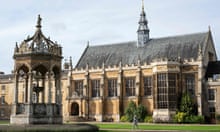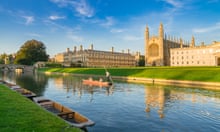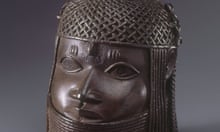Oxford University’s new vice-chancellor has said that one of her first acts will be to investigate the pay and working conditions of the university’s staff, in an attempt to alleviate the “really tough” pressures on junior academics in particular.
Prof Irene Tracey was inaugurated on Tuesday as Oxford’s 273rd vice-chancellor since 1230 – but only the second woman and the first to be educated at an English comprehensive school.
Tracey said she “absolutely recognises” the pressures that young staff members are going through, both from her own experience having been leader of the university’s clinical neuroscience department, as well as in her most recent post as head of Oxford’s Merton College.
In the ceremony at Oxford’s Sheldonian theatre marking her admission, the vice-chancellor announced she would commission an independent inquiry into the pay and working conditions affecting all staff – academic and non-academic.
Staff at Oxford recently took part in national industrial action by members of the University and College Union, which shows no sign of ending after employers’ representatives declined to make an improved offer at a meeting with UCU this week.
“It will be a thorough review of all aspects of our staff’s remuneration package, that’s everything from pay and pensions and in terms of quality of life, because often it’s access to stuff you can’t quantify that can actually make a difference,” Tracey said in an interview with the Guardian.
“It could be access to nursery provision or after-school care … anything that helps people keep the show on the road and makes their life a little bit easier.”
Tracey said she and her husband were only able to cope with the demands of establishing their academic careers and a young family thanks to the help of her elder sister, Clare.
“She really was critical,” she said, in helping the couple through a “really intense period” of starting a family and establishing their respective research teams while her mother was suffering with Alzheimer’s disease.
“It was terrific for my big sister to say: ‘I can do a bit of childcare to help and be your 999 number when you’ve double-booked meetings or one of you is travelling.’
“So we had this lifeline that meant that we had great childcare for our children and the peace of mind that comes with it. It was hugely important and really facilitated our ability to hang in there and keep going.”
Tracey was born at the former Radcliffe Infirmary site in the city centre, which has since been rebuilt and currently houses the university’s humanities school. She grew up in Kidlington, on the outskirts of Oxford, and attended the local state secondary school, Gosford Hill, where her aspirations to attend the university were sharpened by her parents and her teachers.
After gaining undergraduate and postgraduate biochemistry degrees at Oxford, Tracey left for a period of post-doctoral research at Harvard University in the US, before returning to Oxford and later becoming the Nuffield professor in anaesthetic sciences and a member of the UK’s Medical Research Council.
In her new role, Tracey said she wants Oxford to continue its efforts to recruit and admit talented students from state schools, as well as extending its outreach towards minority ethnic and under-represented groups.
after newsletter promotion
“As we have more students coming from diverse backgrounds, there are, I would say, areas that we need to work on, in terms of making sure that when they are here, it’s a place that they do feel included in.
“We’re working hard to recognise how we need to also adapt and change to make sure that there is that inclusiveness,” Tracey said.
Lord Patten, the university’s chancellor and a former Conservative cabinet minister under Margaret Thatcher, paid tribute to Louise Richardson, Oxford’s departing vice-chancellor, for leaving the university in a strong position as a “going concern” in a difficult economic climate.
But Patten’s address was highly critical of the current government’s policies, describing Brexit as “the self-willed departure from our largest export market in pursuit of an elusive and mendaciously spun notion of national sovereignty”.
“We sought to become Singapore-on-Thames but that improbable goal seems to have gone missing in action,” he added.
Patten also dismissed efforts to orientate universities towards the needs of the job market: “Students are not customers in an academic supermarket. We should expect more of the experience a university provides for young people if we want not only a properly skilled graduate workforce but rounded citizens.”








